|
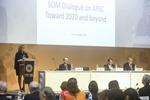 In 1994, APEC’s Economic Leaders committed to achieve the goal of free and open trade and investment in the Asia-Pacific by no later than 2020. Less than five years before this deadline, APEC finds itself within an increasingly crowded international architecture and operating in a more complex and dynamic region. Combined, these factors not only compel us to boost our efforts to achieve the Bogor Goals, but also to start developing a post-2020 vision that identifies and anchors itself in APEC’s unique value-add. 2020, an iconic year for APEC, therefore presents an opportunity to redefine and reinforce APEC’s role. And to get this right by 2020, we need to start the conversation now. In 1994, APEC’s Economic Leaders committed to achieve the goal of free and open trade and investment in the Asia-Pacific by no later than 2020. Less than five years before this deadline, APEC finds itself within an increasingly crowded international architecture and operating in a more complex and dynamic region. Combined, these factors not only compel us to boost our efforts to achieve the Bogor Goals, but also to start developing a post-2020 vision that identifies and anchors itself in APEC’s unique value-add. 2020, an iconic year for APEC, therefore presents an opportunity to redefine and reinforce APEC’s role. And to get this right by 2020, we need to start the conversation now.
Peruvian Vice President Mercedes Araoz delivered a keynote speech at the Dialogue and recalled having been part of PECC's Trade Policy Forum to work on the competition policy project in her previous life as an academic while at the Universidad del Pacifico of Peru.
In addition to achieving free and open trade and investment in the Asia-Pacific no later than the year 2020, the Bogor Goals included a subset of elements such as commitment to the multilateral trade system, trade facilitation, consultations on economic growth strategies, regional capital flows and other macro-economic issues, as well as to intensify development cooperation to attain sustainable growth and equitable development for APEC economies.
APEC is currently finalizing its second-term Bogor Goals review. The initial findings suggest that, since the Bogor Goals were launched, average applied tariffs have fallen and it is getting faster and cheaper to trade across borders. Extreme poverty has dropped by 83.5%, life expectancy continues to increase, and enrolment in tertiary education has more than doubled.
However, the initial findings also suggest that some sectors (i.e. agriculture) have seen higher tariffs, and greater use of non-tariff measures affecting trade. Behind-the-border restrictions continue to affect services trade and investment, negative perceptions on restrictions facing foreign investors are more prevalent and, on average, unemployment and inequality is higher than it was before the Global Financial Crisis. This ‘unfinished business’ should be addressed as much as possible in the coming years, and should also inform our development of APEC’s post-2020 vision.
With this in mind, 2016 APEC SOM Chair's Office(Peru) and PECC co-organized a SOM Dialogue on August 26th, 2016 in Lima, Peru on the sidelines of 3rd APEC Senior Officials' Meeting. Four priority areas discussed at the SOM Dialogue were: services, investment, agriculture, and economic & technical cooperation.
More on the event is found here.
On August 1, 2016, the APEC Ad Hoc Steering Group on the Internet Economy (AHSGIE) held its engagement session in Shenzhen, China. The theme of the session was the Internet Economy: Generating New Momentum for Growth. PECC jointly organized the session with AHSGIE and ABAC. The session mainly discussed the role of internet and digital economy in enhancing inclusive growth, and in promoting connectivity and innovation. The session involved a number of internationally renowned Internet economy practitioners.
On behalf of PECC, Amb. Tang Guoqiang, Co-Chair of PECC, delivered an opening address, in which he emphasized the importance of the Internet economy as a driver of economic growth and the great potential as well as challenges for the Asia-Pacific region to develop Internet economy. He called on engagement with the business society and stakeholders, inclusive growth, minimizing the digital gaps in the region and domestically. He emphasized on the significance of pragmatic cooperation and continued dialogues between government, business and academia.
On the same day, the APEC Business Advisory Coucil (ABAC) held 2016 Asia-Pacific Financial Forum: High-level Symposium in Shenzhen. The theme of the symposium was Public-Private Collaboration to Develop APEC Financial Markets – Achievements and Way Forward. Amb. Tang Guoqiang and Prof. Tan Khee Giap, Chair of SINCPEC attended the Symposium. The support of PECC was acknowledged by Mr. Hiroyuki Suzuki, Chair, ABAC Finance and Economics Working Group; Chair, Asia-Pacific Financial Forum in his opening remarks. The symposium discussed issues related to micro, small, and medium enterprises (MSME) financing, financial market development and integration in Asia-Pacific, role of insurance and pension sector in the regional financial system, potential of fintechs, and financial regulation.
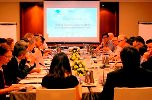 The Pacific Economic Cooperation Council (PECC) in cooperation with the APEC Business Advisory Council (ABAC) organized a policy dialogue on behalf of the APEC Group on Services to explore the ways in which technology is changing how companies deliver services; and the way in which the policy and regulatory environments in which these companies operate need to respond to these changes. The Pacific Economic Cooperation Council (PECC) in cooperation with the APEC Business Advisory Council (ABAC) organized a policy dialogue on behalf of the APEC Group on Services to explore the ways in which technology is changing how companies deliver services; and the way in which the policy and regulatory environments in which these companies operate need to respond to these changes.
Watch video from the workshop (YouTube)
The event brought together entrepreneurs in the technology sector with regulators, policy-makers and experts to understand the opportunities brought by the digital revolution and how to expand services trade and investment.
The purpose of the Workshop was to:
• Understand how changes in technology are opening up new markets for services, as well as goods;
• Consider the extent of opportunities for business to expand trade by utilizing new technologies;
• Consider the cross-cutting nature of the digital economy and consider government policy reforms to maximize the benefits of technology for services trade.
The discussions were shaped around the following key questions:
- How is technology changing business models?
- What is the policy response to the changing business models and landscape brought by disruptive technologies?
- How are these changes going to impact the next generation trade agreements?
Summary of discussions
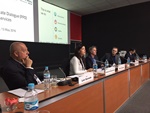 The 5th APEC PPD on Services was co-organized by 2016 APEC SOM (Senior Officials' Meeting) Chair (Peru) and PECC as follow-up from previous meetings held in Surabaya, Clark, Boracay, and Cebu. Given the dominant role of services in GDP and employment in all APEC economies, raising productivity growth, alleviating poverty, and impvoing inclusivity of women and MSMEs (micro, small and medium enterprises), APEC Services Cooperation Framework was adopted by the Leaders in November 2015. The dominant role of services in FDI flows stands in comparison with a traditional under-performance in trade terms, reflected also in a below global average services value added content in gross APEC exports. The 5th APEC PPD on Services was co-organized by 2016 APEC SOM (Senior Officials' Meeting) Chair (Peru) and PECC as follow-up from previous meetings held in Surabaya, Clark, Boracay, and Cebu. Given the dominant role of services in GDP and employment in all APEC economies, raising productivity growth, alleviating poverty, and impvoing inclusivity of women and MSMEs (micro, small and medium enterprises), APEC Services Cooperation Framework was adopted by the Leaders in November 2015. The dominant role of services in FDI flows stands in comparison with a traditional under-performance in trade terms, reflected also in a below global average services value added content in gross APEC exports.
The ongoing series of PPDs aim to prepare the ground for the new APEC Services Competitiveness Roadmap, to question and review the current state of play of the services sector as well as establish an empirical base for an appropriate regional strategy. The discussions at the 5th PPD on Services focused mainly on three inter-related issues:
1) knowledge economy infrastructure (including the stock of human capital and the educational and training needs associated with a shift into services);
2) innovation and the potential for services technologies to change our economies, indeed to change our lives, and the role of structural change and regulatory review-reform; and
3) greater openness to trade and investment, at the border and behind the border.
Without a collective action plan, inter-connectivity and inter-operability will remain inadequate and we will be missing out on the unprecedented growth opportunities that new technologies are able to bring. Some of the important and urgent issues are having to reduce regulatory compliance costs on firms and improving efficiency by removing opaqueness, duplication, overlap and inconsistency in services regulatory regimes. At present, compliance costs disproportionately impact on smaller firms with disadvantages in resources. What needs to happen is that regulation in services need to move from a risk management-oriented approach to a more business enabling mindset. The perennial importance of enhancing trade and investment at the border, to flows of goods, services, capital, people, ideas, and data was also highlited at the PPD held in Arequipa in conjunction with the APEC trade ministerial meeting.
A summary report can be downloaded here.
See a past related conference of PECC: FTAAP: Asia-Pacific Economic Integration by 2020 and Beyond | Beijing, China | 15-16 October 2015
UPCOMING EVENTS
APEC Economic Leaders approved the “APEC Connectivity Framework” in Bali in 2013, pledging to “reach a seamlessly and comprehensively connected and integrated Asia-Pacific through the pillars of physical connectivity, institutional connectivity and people-to-people connectivity”. The 2014 Beijing APEC Economic Leaders’ Meeting endorsed the “APEC Connectivity Blueprint for 2015-2025”, which called on the APEC economies to take agreed actions and meet agreed targets to strengthen the tri-pillar connectivity by 2025. Last year, APEC Economic Leaders re-affirmed the above-mentioned commitment in Manila.
Fully recognizing its pivotal role in promoting economic growth and sustainable development, many regional organizations and economies have taken their own connectivity-related initiatives apart from or even prior to the APEC’s Blueprint. ASEAN formulated its Master Plan on Connectivity in 2010, which has made considerable progress and hence will be renewed in September this year. Pacific Alliance on its part has also taken a number of connectivity-related initiatives within the member economies.
Asia-Pacific Connectivity is not only the prerequisite for realizing the regional economic integration, but also indispensable to revitalizing the economy and promoting the long-term inclusive growth and sustainable development. Based on such premises, this symposium will explore the pathways to connect various connectivity initiatives within the region, facilitating the building of a seamlessly and comprehensively connected and integrated Asia-Pacific.
Agenda of Symposium, "Connecting the Connectivities":
Session 1. The Inner Links between the Regional and Sub-regional Connectivity Initiatives and the Opportunities and Challenges for Connecting these Initiatives
Session 2. Physical Connectivity: Sharing Experiences and Exploring the Practicable Ways of Interconnecting Various Initiatives
Session 3. Institutional Connectivity: Sharing Experiences and Exploring the Practicable Ways of Interconnecting Various Initiatives
Session 4. People-to-People Connectivity: Sharing Experiences and Exploring the Practicable Ways of Interconnecting Various Initiatives
Session 5. Recommendations for Connecting the Connectivity-related Initiatives within the Asia-Pacific Region
Hosted by the Chinese committee for PECC, the Symposium will be held back-to-back with PECC Standing Committee meeting in Yangzhou, China on September 26-28th.
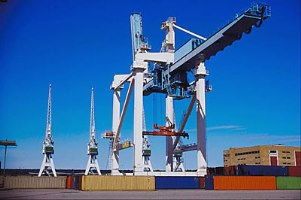 Development of ports and new maritime routes are crucial elements to enhance connectivity and opportunities for economic growth in the Asia-Pacific. The region’s economies depend heavily on maritime trade enabled by reliable, efficient and cost-effective shipping. Development of ports and new maritime routes are crucial elements to enhance connectivity and opportunities for economic growth in the Asia-Pacific. The region’s economies depend heavily on maritime trade enabled by reliable, efficient and cost-effective shipping.
This project is led by the France (Pacific Territories) committee for PECC (FPTPEC) and it consists of a set of three seminars. It focuses on the contribution of the maritime dimension to intra-regional connectivity, sustainability and drivers of growth for the PECC economies and small island states. Under the broad theme of ‘Managing the Blue Economy,’ priority attention has been given to factors leading to the emergence of new trade flow patterns, the associated trade routes, and optimization of port operation capabilities to cope with the ups and downs in trade volumes and tourism throughout the region.
The third and final seminar in the ‘Blue Economy’ series will be held on 5-7 December 2016. Following on from the two earlier seminars, one organized in a small port city the other in a large port city, the concluding seminar will take place in a medium-sized port city of Auckland, New Zealand with a diverse discussion agenda. We will consider the critical place that ports hold in supply chain management, examine the impacts from a trend towards integrated port services, review vital safety and security considerations, identify the likely consequences for regional trade flows of emerging mega-regional agreements, and examine some of the technological and policy innovations being adopted by an increasing number of ports to become more energy-efficient and economically competitive. This cluster of very important factors will bear heavily on how port management structures evolve in the region, and determine the size and scope of long-term investments that public and private sector stakeholders decide to pursue in line with their respective national growth strategies.
MEMBER COMMITTEE UPDATES
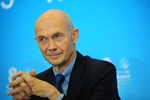 Mr. Pascal Lamy has been appointed the new chair of FPTPEC in a letter from the French Prime Minister Mr. Manuel Valls, dated August 30, 2016. Mr. Pascal Lamy has been appointed the new chair of FPTPEC in a letter from the French Prime Minister Mr. Manuel Valls, dated August 30, 2016.
Mr. Lamy was the Director General of World Trade Organization (WTO) during 2005-2013 and the European Commissioner for Trade during 1999-2004 under the European Commission President Mr. Romano Prodi. He is currently the President emeritus of the European Institute Jacques Delors in Paris as well as the Commissioner in charge of preparing the bid for Paris to host the 2025 World Expo.
Mr. Lamy began his career in the French civil service at the General Inspectorate of Finance and at the Treasury. In 1981 he became advisor of the Minister of Economy and Finance, Jacques Delors, then Deputy Head of Prime Minister’s Pierre Mauroy cabinet in 1983. Between 1982 and 1994, Pascal Lamy was Head of the President of the European Commission’s Cabinet, Jacques Delors, and its sherpa at the G-7. He succeeds Mr. Michel Rocard, the former Prime Minister of France who served as chair of FPTPEC till July 2016.
 Hon. Michel Rocard, Chair of France (Pacific Territories) committee for PECC (2001-2016) and former prime minister of France (1988-1991) lost his battle to cancer and passed away at the age of 85 on July 2nd 2016 in Paris. He is survived by his wife and four children. Hon. Michel Rocard, Chair of France (Pacific Territories) committee for PECC (2001-2016) and former prime minister of France (1988-1991) lost his battle to cancer and passed away at the age of 85 on July 2nd 2016 in Paris. He is survived by his wife and four children.
As an ardent supporter of regional integration and cooperation, as the Chair of FPTPEC, he devoted much energy to encourage and promote the work of PECC to the French authorities and abroad. He has always demonstrated an acute interest particularly in sustainable development issues, and the social aspects of globalization.
He also served as the Minister of Territorial Development in 1981 to 1983 followed by Minister of Agriculture in 1983 to 1985, both under President Mitterrand. From 1994 to 2009, he served as a member of the European Parliament.
One of his immediate achievements upon assuming his post as the Prime Minister was the negotiation of Matignon Accords that brought truce between the separatists and loyalists in New Caledonia, a French territory. He continued to remain deeply interested in developments in the French Pacific Territories and actively supported their engagements in PECC process throughout his chairmanship of FPTPEC.
In May 2016, he chaired the annual meeting of FPTPEC and until the very last days he has contributed to discussions on formulating the future work and organization of FPTPEC. His presence and vigor will be greatly missed by the entire PECC community.
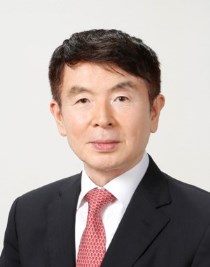 The new President of Korea Institute for International Economic Policy (KIEP), Dr. Jung Taik Hyun was inaugurated as the Chair of KOPEC on June 28th 2016. The new President of Korea Institute for International Economic Policy (KIEP), Dr. Jung Taik Hyun was inaugurated as the Chair of KOPEC on June 28th 2016.
Before joining KIEP, he served as a Senior Secretary for Policy Coordination at the Blue House, Vice Chairman of National Economic Advisory Council (NEAC), Vice Minister at the Ministry of Gender Equality and Family (MOGEF), Chairman of Korea Trade Commission, Professor of Department of International Trade and Regional Studies at Inha University, and President of Korea Development Institute (KDI).
He received his Ph.D. in Economics from George Washington University, M.B.A. from Sloan School of Management at MIT, and B.A. in Economics from Seoul National University.
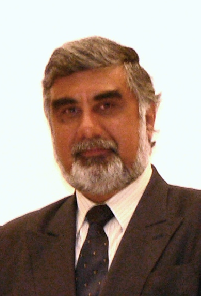 Ambassador Jose Antonio Bellina Acevedo has been appointed the new chair for Peru committee for PECC. He is currently the General Director of Asia and Oceania at the Peruvian Ministry of Foreign Affairs. Ambassador Jose Antonio Bellina Acevedo has been appointed the new chair for Peru committee for PECC. He is currently the General Director of Asia and Oceania at the Peruvian Ministry of Foreign Affairs.
Previously he has served as Ambassador of Peru to Canada (2010-2015), Vice-Minister for Defense Policies at the Ministry of Defense (2008-2010), Director General for International Affairs at the Ministry of Defense (2006-2008), and Director General for Security and Defense Affairs at the Ministry of Foreign Affairs (2006). He has also served as the Head of Mission to the Embassy of Peru in Panama (2001-2006) and as the Deputy Chief of Mission at the Embassy of Peru in Argentina (1996-1999). He graduated from the Diplomatic Academy of Peru in 1976 and is a member of the Institute for International Studies of the Pontificia Universidad Catolica del Peru.
|









